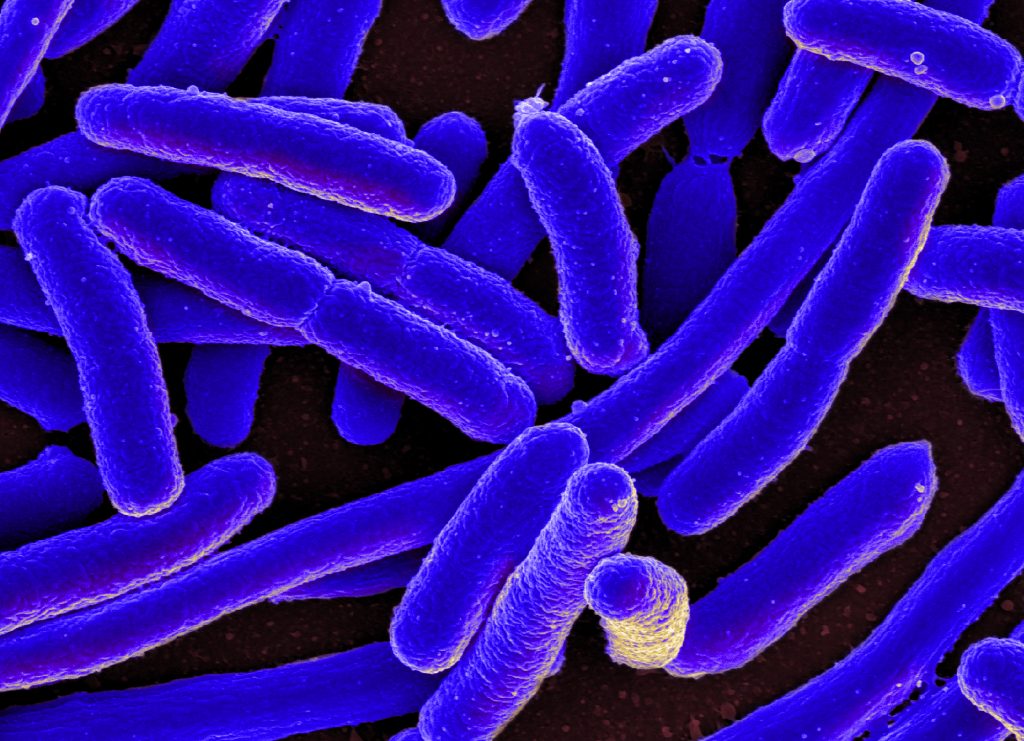DNR Planning New E. Coli Regulations
State business lobby concerned DNR will consider stricter PFAS standards too.

Colorized scanning electron micrograph of Escherichia coli, grown in culture and adhered to a cover slip. Photo by NIAID, CC BY 2.0 <https://creativecommons.org/licenses/by/2.0>, via Wikimedia Commons
State regulators may now begin crafting groundwater standards for E. coli bacteria to bring Wisconsin in line with federal drinking water standards.
The Wisconsin Natural Resources Board unanimously approved a statement of scope and public hearing Wednesday, kicking off a two-and-a-half year process to develop standards for E. coli. The state Department of Natural Resources will develop a rule to replace the existing groundwater standard for total coliform bacteria, which would become an indicator of whether E. coli is present in groundwater.
“The intent of these rules is to protect you when you’re drinking water at your home to avoid some of the violent illness and occasionally life-threatening effects that can happen from ingesting bacteria,” Bruce Rheineck, the DNR’s groundwater section chief, said.
Some types of E. coli bacteria can cause short-term stomach illnesses, such as diarrhea, nausea and vomiting. In severe cases, E. coli can lead to kidney failure and hepatitis.
The Wisconsin Department of Health Services recommended groundwater standards for 27 substances in June 2019. The list included recommended limits for the two most common types of harmful, so-called forever chemicals known as PFAS, as well as E. coli bacteria, trichloroethylene, hexavalent chromium and other substances.
Republican state Sen. Steve Nass, who co-chairs the Legislature’s Joint Rules Committee, requested a preliminary hearing in March about the proposed rule before the agency could begin crafting standards for the bacteria.
The state’s largest business lobby Wisconsin Manufacturers and Commerce, the Wisconsin Paper Council, and the American Chemistry Council asked the DNR to clarify that only standards for E. coli are being sought this round in comments submitted to the agency as part of that hearing. They highlighted “numerous concerns” with the proposed regulations voted down by the board in February.
“Our concerns included — but were not limited to — the Department’s statutory authority for the rule, the rule’s compliance costs, and the scientific justification for the standards included in the rule,” the groups wrote.
In 2016, the Environmental Protection Agency changed how bacteria are regulated in public water supplies. As a result, the state removed a maximum contaminant level for total coliform bacteria and replaced it with a maximum contaminant level for E. coli bacteria in drinking water, which is considered a more specific indicator of fecal contamination.
The DNR anticipates the economic impact of the proposed standard on small businesses would be minimal, and the agency expects savings through avoided health and drinking water treatment costs as part of efforts to reduce or eliminate pollution.
Listen to the WPR report here.
Wisconsin environmental regulators may begin crafting standards for E. coli bacteria in groundwater was originally published by Wisconsin Public Radio.
More about the PFAS Problem
- PFAS Levels in Great Lakes Fish Are Dropping - Danielle Kaeding - Feb 6th, 2026
- Gov. Evers and GOP Lawmakers Near a Deal on PFAS Pollution - Danielle Kaeding - Jan 22nd, 2026
- Gov. Evers Optimistic About Reaching Final Deal With Republican Lawmakers to Secure Release of $125 Million in Long-Awaited Pfas Investments - Gov. Tony Evers - Jan 21st, 2026
- Bipartisan Push to Tell Counties Faster When Water Tests Fail - Henry Redman - Dec 19th, 2025
- MKE County: County Seeks to Sue PFAS Producers, Oil Companies - Graham Kilmer - Dec 10th, 2025
- Wisconsin Reviewing EPA-Approved Pesticides For PFAS - Danielle Kaeding - Dec 9th, 2025
- State Nears Settlement with Johnson Controls/Tyco Over PFAS Spills - Danielle Kaeding - Dec 4th, 2025
- Senate Bill Promotes Soybean-Based Firefighting Foam to Replace PFAS - Danielle Kaeding - Dec 2nd, 2025
- Test Results Show High PFAS Levels in Wisconsin’s Landfill Runoff - Danielle Kaeding - Dec 2nd, 2025
- Wisconsin Communities Get $282 Million for Drinking Water Projects - Danielle Kaeding - Nov 19th, 2025
Read more about PFAS Problem here




















